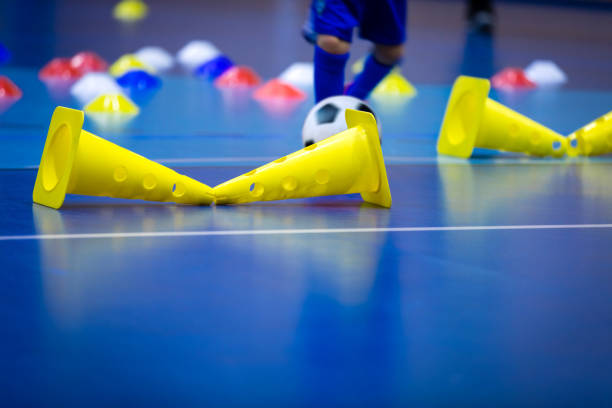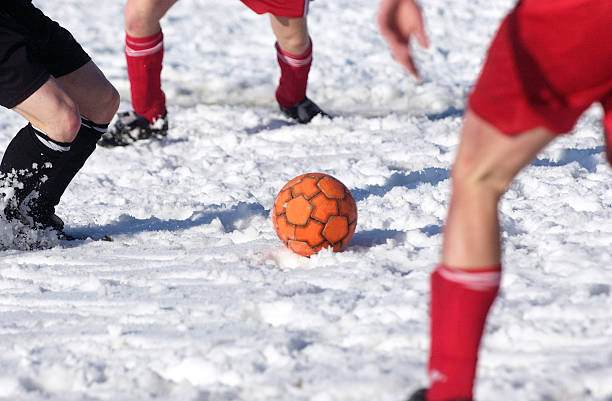
11 Benefits to Indoor Winter Soccer Training
As the winter season approaches, many soccer players and coaches face the challenge of continuing their training without being disrupted by freezing temperatures, snow, or icy conditions. For young athletes especially, staying engaged and improving their skills year-round is essential for their growth and readiness for competitive play. Indoor winter soccer training offers a solution, providing a controlled environment where players can focus on their game without the challenges posed by the elements.
Training indoors during winter is not just about staying warm. The structured, fast-paced environment of indoor soccer allows players to develop their technical, physical, and mental skills in unique ways. Let’s explore the many reasons why indoor winter soccer training is a game-changer for young athletes.
11 Benefits to Indoor Winter Soccer Training
1. Weather Independence
One of the most obvious benefits of indoor soccer training is the ability to avoid the unpredictability of winter weather. Outdoor training sessions are often canceled due to rain, snow, or freezing temperatures, disrupting player progress. Indoor facilities, on the other hand, provide a consistent and reliable space for uninterrupted training, ensuring that athletes can maintain their momentum throughout the season.
2. Improved Technical Skills
Indoor soccer emphasizes technical ability, as the smaller playing area and faster pace require precise ball control, quick decision-making, and accurate passing. Players are constantly engaged, with more touches on the ball compared to outdoor games. This sharpens their dribbling, passing, and shooting skills, making them more effective on the field when the outdoor season resumes.
3. Enhanced Agility and Reaction Time
The confined spaces of indoor soccer demand rapid movements, sharp turns, and quick thinking. Players must react instantly to changes in play, which improves their agility and overall athleticism. This heightened awareness and responsiveness translate directly to better performance in outdoor matches, where quick reflexes are critical.
4. Better Tactical Awareness
Indoor soccer places a strong emphasis on tactical play due to the smaller field and faster transitions. Players learn to position themselves effectively, anticipate their teammates’ and opponents’ movements, and adapt to changing situations on the fly. This development of tactical awareness is invaluable for improving game intelligence in outdoor competitions.
5. Increased Cardiovascular Fitness
Indoor soccer is fast-paced, with little downtime between plays. This keeps players in constant motion, providing an excellent cardiovascular workout. The high-intensity nature of indoor soccer mirrors interval training, helping players build stamina, endurance, and overall fitness that will benefit them during longer outdoor games.
6. Opportunities for Small-Sided Games
Indoor facilities are perfect for small-sided games like 5v5 soccer. These games ensure that every player remains actively involved, with frequent touches on the ball and opportunities to make meaningful contributions. Small-sided formats are ideal for improving individual skills and teamwork in a condensed, high-energy environment.
7. Individual Skill Development
Unlike outdoor training, where larger team dynamics often take precedence, indoor winter soccer training offers more opportunities for individual skill development. Coaches can focus on the specific needs of each player, providing targeted feedback to improve weaknesses and build confidence.
8. Reduced Risk of Weather-Related Injuries
Slippery, uneven, or frozen outdoor fields increase the risk of injuries such as sprains, strains, and falls. Indoor facilities eliminate these hazards by providing safe, even surfaces designed specifically for soccer. This allows players to train effectively without the added risk of weather-related injuries.
9. Year-Round Progress
Indoor winter soccer training ensures that players continue to develop their skills, fitness, and game sense even during the off-season. This consistent progress prevents skill regression and keeps players ready for competitive play when the outdoor season resumes.
10. Exposure to Futsal-Style Play
Indoor soccer often mirrors futsal, a variation of soccer that emphasizes technical skills and quick gameplay. Futsal requires precision, creativity, and speed, making it an excellent training tool for players looking to elevate their overall soccer abilities. Participation in futsal-style play prepares players for both indoor and outdoor competitions.
11. Fostering Team Spirit and Social Bonds
Training in an indoor environment promotes camaraderie among players. Regular sessions and games strengthen team bonds, enhance communication, and improve chemistry both on and off the field. This team spirit plays a crucial role in creating a supportive and cohesive playing environment.
Conclusion
Indoor winter soccer training is more than just a practical solution for the colder months—it’s a transformative experience that helps players develop their skills, improve their fitness, and deepen their passion for the game. By focusing on technical proficiency, tactical awareness, and physical conditioning, players emerge stronger, faster, and more confident.
At YTP Futsal, we offer two dynamic winter soccer programs designed to maximize the benefits of indoor training:
: A skill-development program where players or teams work with expert coaches to refine their techniques and build confidence in a supportive environment.
: A competitive league-style program that mirrors professional formats like the NBA, providing players with the excitement of structured games and the opportunity to improve through real match scenarios.
Whether you’re looking to enhance your skills or simply stay active during the winter months, YTP Futsal’s programs provide an unparalleled training experience.
Frequently Asked Questions
What types of drills are best for indoor winter soccer training?
Drills that emphasize ball control, agility, and decision-making are ideal for indoor settings. Examples include rondos (keep-away drills), passing triangles, dribbling through cones, and 1v1 challenges. Small-sided games also provide excellent practice for real-match scenarios.
How can I stay motivated during indoor winter soccer training?
Set achievable goals for each session, such as mastering a new skill or improving fitness levels. Participating in a structured program like YTP Futsal Academy can also keep players engaged and motivated by providing professional guidance and a clear path to improvement.
How can I replicate outdoor game conditions indoors?
To mimic outdoor scenarios, use full-sized futsal goals and divide the field into zones for strategic play. Incorporate set-piece drills and practice transitions to simulate outdoor gameplay dynamics. Indoor soccer balls, which are slightly heavier, can also help replicate the control required in outdoor matches.

